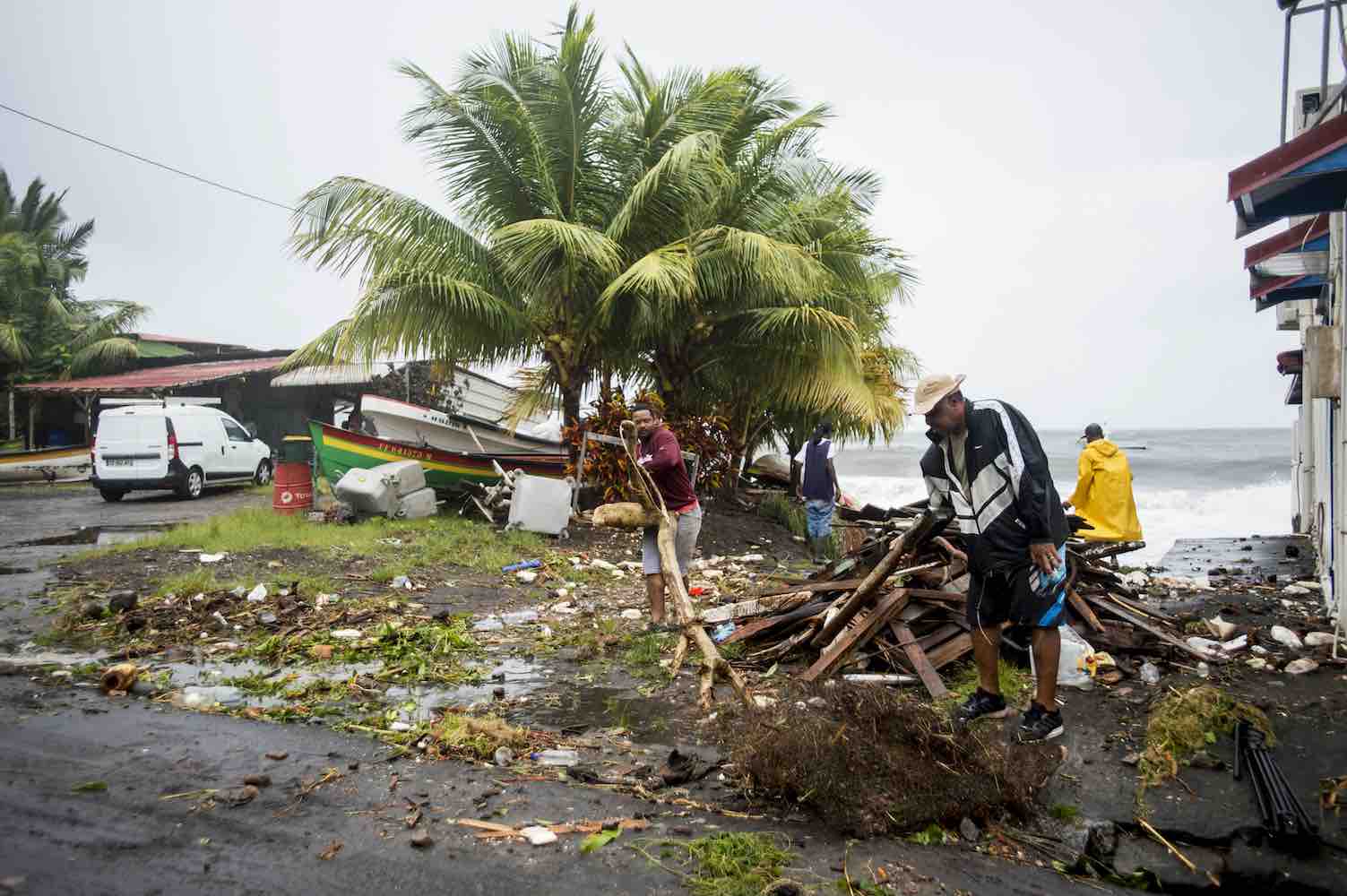Excerpt: In Greece, Melissa Network Takes Leadership From Refugee Women
When it comes to finding new ways to organize society, some Greeks are finding inspiration in surprising places. Like in the community of migrant women organized by Melissa I visited in Athens. Check out the whole show. - Laura
Nadina C.: We're at the day center of Melissa network. In the heart of Athens, Victoria Square. Melissa is a network for migrant and refugee women who live in Greece. Melissa means honey bee in Greek. And the idea of a day center was to create a kind of beehive. This also explains our vision of society. It stands for what our vision is. Which is, a society is an open beehive of communication, creativity and exchange.
Marzia Jamili: My name is Marzia Jamili. I'm from Afghanistan. I am 16 years old. I was born as a refugee. I came to Greece last year. I was very happy to come here and I feel myself very safe because when we were in the camp, the camp was not very safe. And I feel very happy in this place. Melissa now is like my house and they're like my family.
Nadina C.: In Melissa we have the involvement of women from over 45 countries. As well as many of the most active organizations. Women's groups, associations and organizations. So it's the long-term migrants who are actually involved in the implementation of our current program. Because long term migrant women are the ones who know better than anybody else, or who are better positioned to know what works in terms of integration and what doesn't work.We've created all together a sort of holistic approach to what we see perceive of as integration and it's based on literacy support, psychosocial support, art and creativity, information sessions. So we do a lot of information sessions on social rights, legal rights, labor rights, all the different sets of things that they ought to know.Read more
Jones Act: Blocking Aid to Puerto Rico
The 1920 Merchant Marine Act is a longstanding polict that directs all the transportation of goods between US ports to be done by US vessels exclusively. This means that ships from other countries can’t transport supplies between US harbors. That limits the number of available boats, even in unusual, extreme situations such as what Puerto Rico is experiencing now.

In the past, the US department of Homeland Security has been known to lift the policy -- colloquially known as the Jones Act -- but has refused to do so in the case of Puerto Rico after Hurricane Maria. Despite lifting the Act after Hurricane Harvey and Irma, in Texas and Florida, respectively, the DHS refused today to do the same for Puerto Rico. This, in a US-occupied state where 3.5 million residents have lost power, and up to a million US citizens are without water.
F-Word: Made Homeless by Hurricanes? This Budget’s Not for You.
Hurricanes, floods, fires, blazing heat and rain, the wretched weather has caused climate change deniers especially, much consternation. As to the possible explanation……. when hundreds of thousands of homeless people start appearing in our streets next January, it’ll be easy to explain. We let it happen, in the 2018 federal budget.

Excerpt: Thanu Yakupitiyage - The Refugee Crisis Is A Climate Justice Issue
 Photo courtesy Wikimedia Commons
Photo courtesy Wikimedia Commons
Laura Flanders: A new study by Cornell University finds that roughly one-fifth of the world's population could become climate change refugees by 2100. The majority of those will be people who live on coastlines around the world including about two million in Florida alone. Escalating refugee migrations, rising waters, and hotter than ever summers may appear to be different crises, but in reality, they are rooted in a joint emergency, says today's guest. We better start addressing them simultaneously. To that end, Thanu Yakupitiyage came from New York's immigration coalition to work as the US communications manager for climate justice organization, 350.org. She is clearly a connector. She's also a DJ. Thanu, welcome to the program. Glad to have you.
Thanu Y: Thank you for having me.
Laura Flanders: This is kind of an interesting transition for you, going from immigrant rights work to the work that you're doing at 350. You were doing communications at both organizations, but what's changed? What's new?'
Full transcripts when you subscribe, starting at just $2 a month.
Read moreExcerpt: Ed Whitfield - Against Consumer Politics in the New Economy
Laura Flanders: Not long ago former Vice President Al Gore called for the impeachment of Donald Trump. He's not the first to call for impeachment nor will he be the last, but what would it take to impeach not a person but the system of which he is a product? That's the question activist-philanthropist Ed Whitfield, co-director of the Fund for Democratic Communities in Greensboro, North Carolina was raising a few months back when we had a chance to connect at a meeting of the New Economy Coalition in Chicago.
Read more
Ed Whitfield: I have been a political activist pretty much all of my life. I've spent a lot of time reading, studying. I've worked 35 years in industry, kind of self-funding the political activity that I did when I got off work. That included runs for political office. It included community organizing, spending a lot of time talking to working class people, and I found in the course of talking to people that a number of people are kind of eager to hear kind of refreshing ideas of how we can understand the world and how we can behave in the world.
F-Word: Anti Racist Rebellions Deserve Their Own Monuments
The removal of monuments and memorials dedicated to the Confederate States of America has been gaining steam ever since the Charleston church massacre of 2015 and it's taken off after the racist Unite The Right uprising in Charlottesville this summer. Dedicated to those who fought and killed for the Confederacy which, before the civil war, supported the extension and expansion of slavery, the vast majority of those monuments were erected in the Jim Crow era to intimidate African Americans seeking civil rights. No matter, so they're defenders. They're simply about honoring history. When he was just a Republican Alabama Senator, Attorney General Jeff Sessions called removing the Confederate flag from public buildings an effort by the "left" to delegitimize the fabulous accomplishments of our country.
Let's think about that. Jeff Sessions and Donald Trump and I might disagree about the Civil War but when it comes to throwing off British colonial rule, I bet we'd agree about that. To celebrate that accomplishment, how about we erect some monuments to the motley crew? As Peter Linebaugh points out in his important book, The Multi-Headed Hydra, slave revolts and slave trade mutinies were the real precedents of the events of 1776. You want heroes? How about Tacky, the leader of a 1760s slave rebellion that raged for months in Jamaica. Tacky's revolt left 60 whites and several hundred slaves dead after it was suppressed by Colonial troops but it inspired revolts across the Caribbean and into New England.
Read moreLF Excerpts: In Bolivia, State Power Must Connect to People Power
Laura: Wherever you are in the world, being in government is hard. Still, all sorts of progressives and radicals pursue high office. This century started with new people in groups winning state power in countries like Bolivia, where Evo Morales became the first indigenous president backed by a popular movement, Vivir Bien. In 2015, Greeks selected the progressive left block's Syriza for the first time. This spring, I had a chance to talk with men who served in those administrations about their expectations, experiences, and what they learned about doing governance differently. Andreas Karitzis served with Syriza, Pablo Solón with President Morales.
Read more
Pablo Solón: During the year 2005, Evo Morales won the election. We had a new constitution. We changed our ... The name of our state is now Plurinational State of Bolivia, recognizing that we have more than 30 nations inside Bolivia of indigenous people. That was a great, great moment and it lasted for three, four years.
Notes on Charlottesville
Dear friends and allies, I am watching the news and considering this moment.
We need all the love we can muster to combat so much hate. I pledge to express more love.
We need brave visionaries in governance. I pledge that The Laura Flanders Show will continue to find and celebrate them.
We need local justice-makers, defenders of the oppressed, and we need them funded. Help us find and publicize them.
Yesterday we were normalizing nuclear war: (just don't condition your hair we were telling the people of Guam). Today it's Nazis. Fascism is not "alt-right", it's fascism. I promise to keep featuring truth-tellers and stand-takers. Name yours.
LF Excerpts: Music, Spirit & Protest: The Hippie Idea & Climbing Poetree
Can music make a movement? This week legendary music producer Danny Goldberg takes us back to a time when all you need is love was not meant to be ironic. Danny will reflect on the 50 years since the summer of love and go in search of the lost chord the title of his new book. Then from today's music movement scene, Alixa Garcia and Naima Penniman of Climbing Poetree talk about their new album Intrinsic and perform live in studio.
Laura Flanders: This summer marks the 50th anniversary of the summer of love, the hippie revolution. It's also the year that Muhammad Ali was convicted of failing to report for the draft and Dr. King came out against the Vietnam war. In 1967, Stokley Carmichael championed black power. Rebellions in Newark and Watts left those communities in flames. In a time not unlike our own, the establishment was on the rocks it seemed but its critics spoke in no single voice. Would change come through love, through rage, through be-ins or sit-ins? Long time music executive and author Danny Goldberg has returned to 1967 in his new book In Search of the Lost Chord. What was lost, what was found and why go back there? Goldberg is also the former CEO of Air America radio and the author of Dispatches from the Culture Wars: How the Left Lost Teen Spirit. Danny, welcome back to the program. Glad to have you.
Danny Goldberg: Hi. Thanks for having me.
Laura Flanders: Good to see you. Were you a hippie? Do you think of yourself as having been a hippie?
Danny Goldberg: I identified with the hippies. It was a funny word. It was really a media creation of some columnist in San Francisco and people always had mixed feelings about calling themselves hippies at the time but in retrospect, of the different tribes as they said that existed then, I'd probably identified a little more with the hippies than the others.
Laura Flanders: So what did the media get wrong in our understanding of hippie, that word, media creation or not?
Danny Goldberg: Well, I think over the years it's become dumbed down to a kind of cartoon version that consists of just long hair on guys and slang like "groovy" and "cool" and "far out" and the Cheech and Chong type stoners and those things were part of it. People did get stoned. The guys did have long hair. We saw the Beatles were attractive to girls with longer hair so we all said "Let's try that."
Laura Flanders: Reason enough.
Danny Goldberg: But to me, at its core and the subtitle of the book is 1967 and the Hippie Idea and why I coined that phrase was that behind those symbols which very quickly became passe, co-opted by commercialism and predators, behind it to me was a spiritual movement, a reaction against materialism and in some part for some people a reaction against the religions they were born into, but one of the reasons to go back in time, hopefully not just nostalgia although there are people of my generation that we do like kind of reliving those moments, is to identify human things that aren't dependent on the 24 hour news cycle or the fashions of the day that are the same really in some ways from decade to decade and century to century and that ebb and flow in mysterious currents. And the idea that there was more to life than just how much money you made or what university degree you got was a revelation to a lot of people in the sixties which was coming out after all of the fifties which were known as the sort of Mad Men materialistic time and between the suspicion of authority that was bred by the war in Vietnam which for many of us was incomprehensible, the upheaval involving race relations, trying to finally remedy this horrible legacy of segregation, slavery in the country, the early stirrings of feminism and the gay rights movement which came a little bit later in terms of the public eye but were obviously bubbling up in the culture at that time and the sudden availability of psychedelics. It was a lot going on.
Read moreLF Excerpts: Reality-based Economics with Renegade Economist, Kate Raworth
Throw out what you think you know about economics. This week, self-described renegade economist Kate Raworth of Oxford University explains how to think like a reality-based economist. And two ecofeminists, one from South Africa the other Mauritius, share a chat under a tree about Marx, feminism, and life on the planet.
Read moreLaura Flanders:Throw out the growth curve. Embrace the doughnut. What the world needs now is planetary, not flat-plane economics. That is the message of a new book by self-described renegade economist, Kate Raworth. For too long our mind's eye map of our economy has been all wrong, she says. Simplistic on its face, wrongheaded in what it tries to depict, and altogether not helpful to a reality-based world with limited human and planetary resources. Lucky for us, Kate's got a fix, seven ways to think like a 21st century economist, and as befits her concern with images and maps, she has sketched out a new picture, not an ever-rising takeoff line or even a humpbacked cosmic curve. It's concentric circles, hence the title of her book, Doughnut Economics. Raworth's an advisory member at Oxford University's Environmental Change Institute and teaches in its masters program for environmental change and management. She's in the United States on a book tour. The book's just out from Chelsea Green Press. Welcome to the program, Kate. Great to have you.
Kate Raworth:My pleasure.
Laura Flanders:So, tell the story of how our map of the economy got so poorly diagrammed and what GIs had to do with it.
Kate Raworth:Well, poor old Simon Kuznets back in the 1930s, the American government asked him to come up with a measure of national income, which he did. And he said when he first produced it, "Don't mistake this for the welfare of the nation." His caveat got put aside because once there was a single number of what the economy was worth and you could compare it to other countries and look at it year and year, we got hooked on growth.
Laura Flanders:And you had that nice little upward going on.
Kate Raworth:That's right. So, this curve. The picture of what economic success looks like in our minds is this ever rising line that just goes up, up, up, up. Endless growth.
Laura Flanders:And what's the problem with that picture?
Kate Raworth:The problem with that picture is if you think about nature, 3.8 billion years of experimentation, nothing in nature from your children's feet to the Amazon forest, nothing grows forever. Things in nature, they grow, healthy phase, but then they mature and come to thrive. What I find extraordinary is that when I studied economics at university and I'll bet anyone studying now, the question as to whether an economy comes to a maturity point and then thrives, it's not asked. What if the economy can't grow forever? What would it look like to create an economy that didn't try to grow forever, but that it thrived? I think these are questions we need to start asking.
Laura Flanders:So, what does it matter if we have a wrong image, and hasn't it been corrected and debunked and challenged?
Kate Raworth:So imagery, what I've learned is imagery is incredibly powerful, and if you open an economics textbook it's full of words, it's full of way too many equations, and often there's a little picture on the side as if just a mere illustration, but any neuroscientist will tell you that over half of the nerve fibers in your brain are serving your visual cortex, and any image goes into the back of your brain and it sit there. It lingers like economic graffiti long after the words and equations have faded. So, we really should pay a lot of attention to the pictures that we use to draw what the economy is and what it's for and who we are and how it works.

